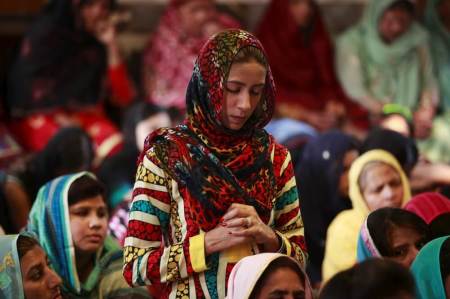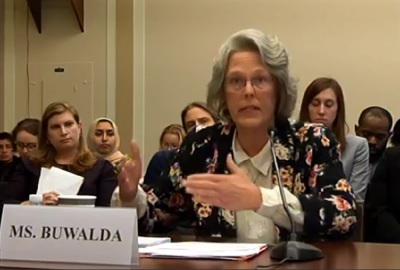UN subjects persecuted Christian refugees in Thailand to unfair burden, expert tells Congress

Thousands of Pakistani Christian asylum-seekers in Thailand are subjected to an unfair burden of proof by the United Nations, which has led to many denials for believers fleeing persecution, a human rights lawyer told members of Congress Tuesday.
Ann Buwalda, the director of the international advocacy group Jubilee Campaign USA and founder of Just Law International, testified before members of House Foreign Affairs subcommittee about the crisis of religious and ethnic minority asylum seekers in Thailand.
As Pakistan ranks as the fifth-worst country in the world when it comes to Christian persecution, thousands of Pakistani Christians migrate to countries like Malaysia and Thailand in search of refuge from societal violence associated with their faith in Christ in the 97-percent Muslim Pakistan.
According to Buwalda, Jubilee Campaign estimates that there are as many as 3,000 to 4,000 Pakistani Christian refugees in Thailand with cases pending before the United Nations High Commissioner for Refugees. Many of those refugees are in the city of Bangkok.

“Some of them are approved and awaiting resettlement,” she explained. “But some cases are closed and affording them with no place to go.”
Buwalda entered into the testimony the case of Michael D’Souza, a Pakistani Christian who was denied refugee status by the UNHCR in Bangkok and was forced to stay in Bangkok’s notorious Immigration and Detention Center (IDC). The conditions at the center, Buwalda and other rights activists say, are “deplorable.”
“[A]fter one year of suffering through that and no hope, he returned to Pakistan. Michael D’Souza was brutalized by the very people he feared would persecute him,” Buwalda said. “His case should not have been denied and he remains stranded in Karachi, Pakistan.”
Conditions in the IDC are so rough that some have died inside of the center. Many are brought there after being arrested in immigration raids.
In May 2017, one Christian man accused of blasphemy in Pakistan died in the center after authorities neglected to provide him with treatment to a curable health condition.
As for D’Souza, Buwalda says that his case demonstrates the fact refugees fleeing religious persecution “should be provided with opportunities to have their cases with more reasonableness.”
“We have found that with many of the cases within UNHCR in Bangkok, there are denials because there is an unreasonable standard and burden of proof placed upon them,” she explained. “We have many cases, as do colleagues of ours, that assist with the refugee processing. It clearly appears to us that UNHCR in Bangkok has placed a higher burden of proof on Pakistani Christian asylum seekers.”
Buwalda and her colleagues have tried to raise awareness about the struggles facing Christian asylum seekers in Thailand.
“We have approached the UNHCR. They are sympathetic. But the conditions in terms of the interviews have not changed,” Buwalda said. “We would like to see that change take place.”
Pakistani Christians are not the only ones seeking asylum in Thailand as there is also a group of about 500 Montagnards from Vietnam also being detained in Bangkok.
“[T]hey're in the horrible situation at the IDC detention center where there are actually mothers separated from their children and not allowed to even give them breastfeeding,” she detailed.
Ranking member of the subcommittee Rep. Chris Smith, R-N.J. voiced his concern with the fact that only “10 to 30 percent” of the Pakistani Christians in Thailand are being granted refugee status by the UNHCR.
Smith, who authored the Frank R. Wolf International Religious Freedom Act of 2016, wondered how Congress could hold UNHCR accountable.
“I've sent letters to them. I've talked to officials. We've talked to the UNHCR and we seem to get nowhere,” Smith explained.
Buwalda responded that one of the reasons why the denial rates are so high is because UNHCR has an “unbalanced burden of proof” placed on the Pakistani Christians because of a level of “skepticism.”
“We have we had a UNHCR official describe the basic skepticism of Pakistani Christians asylum seekers there that demonstrated that there is probably system-wide [issues] within Bangkok [of] not effectively handling these cases,” Buwalda contended.
She noted that there was an effort in 2016 and 2017 within the UNHCR in Bangkok to “bring backlogs down.”
“What they did was rush cases through. The fastest way for doing that is to deny them and that also came with average credibility claims,” Buwalda recalled. “With an average credibility claim, you have almost no chance on any appeal and you're left hopeless. The anecdotal evidence we have and the information we have is significant in terms of the numbers.”
Buwalda stated that UNHCR’s own reports demonstrate that Pakistani Christians do in fact suffer persecution.
“One of the examples I gave in my testimony I submitted is Talib Masih,” she told the Congress members. “Masih was listed in [UNHCR’s] own report prior to them denying his case for asylum in Bangkok and we worked very hard, his case has been reversed. But now he has no place to go. He's not been referred to any country at this stage, one year later, for resettlement. So, we're remaining concerned about him and others that should be resettled.”
Follow Samuel Smith on Twitter: @IamSamSmith
or Facebook: SamuelSmithCP





















